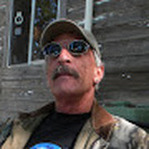 Randy Godwin
Randy Godwin Two Georgia boys thinking about enlisting during World War One, go to ask a grizzled old veteran of the Civil War battle of Fredericksburg, what it was like in war and to ask him for any advice he can share with them. What he has to reminisce on and say is not necessarily what they wanted or expected to hear, in this tale with a classic Randy Godwin twist-ending that he is so admired for in many of his fiction writes..
Fredericksburg was a great victory for southern forces led by General Robert E. Lee in December of 1862, largely because of Stonewall Jackson's stalwart men on the right of the six mile long Confederate line and the troops on the left who had the semi-protection of the infamous stonewall on Marye's Heights. Just over six months later, though, at the titanic struggle of Gettysburg, on its last day, the situation was reversed and the boys in blue claimed ultimate victory in the three day battle with their own defense of a deadly wall of stone in the center of their fish-hooked shaped battle line.
For any reader unfamiliar with Randy Godwin's writings it comes highly recommended they check-out the other three guest writes Randy has on Once Upon a History; and his outstanding site can be found on the net via the button below:
“I don’ t really know now which was worst,” the old man said “killin’ the
enemy, or them a killin’ me. Not in thet woah, at least. It was plain
murder, ye see. Me being a sure shot, astandin’ behind thet wall, an’ them
a comin’ all grouped together jest like a covey of quail. Weren’t no
chanct fer ’em, no chanct at all”.
"I kin still see their eyes across the open ground, looking scairt, as
they shoulda been. They wuz a starin' death in the face, but they came on
anyways. I had ta shoot 'em, elsewise they'd a shot me. Warn't no choice
in the matter. It was live or die, and plenty did jest that. Seemed like
more died than lived on their side, though."
Dreams Of War
The grizzled old gentleman speaking these words was a veteran of the Civil
War, who--it was said--managed to escape many battles without losing an
arm, leg, or other bodily appendage. Rarer than you may think.
My friend, Jim Downing, and me--me being Bobby Young--were thinking about
enlisting into the army. We wanted to see the world outside of Clear
Springs, Georgia, wanted to experience life other than looking at the
backside of a mule from sunrise to sunset.
World War I was in progress. Just think of it, all the big guys slugging
it out, deciding the history of the world. We had read of such things of
course, but they always seemed like fairy tales in a way. We both had
turned 18 not long ago and had had enough of country life. We were ready
to see the world.
I told Pa that Jimmy and me were thinkin’ of joinin’ up. He didn’t have a
lot to say about it at first, but I could tell he didn’t think very much
of the idea at all. Without me to help him on the farm he couldn’t take
advantage of the high prices crops would bring during the war. At least
that was part of it, anyways.
The Bargain
“Tell you what,” he said “if you and Jimmy will go on over to Mr. Douglas
Sims house Sunday afternoon and ask him what he thinks about y’all jinin’
up for this woah, I’ll give you my blessing if ’ats whut you want. I’ll
tell ’im yore a comin’ so he’ll be there awaitin’ fo ye”. I agreed and
Jimmy said it was fine with him too.
Those next two days seemed to drag by as I walked in the plow furrows
following old Maude from one end of the hot field to the other. But
finally Sunday came. After church and the traditional Sunday meal, Jimmy
and I met at the crossroad--each of us astride our former plow mules--and
meandered over to Mr. Sims old farm house along Taylor’s Dread swamp.
We had heard tales about Mr. Douglas, of course.
He was once the best rifle shot around, they said. He fought at Fredericksburg behind the famous--or infamous, depending on which flag you rooted for--stone wall.
Yes, that one. Beside the sunken road along Marye’s Height, behind the
barrier composed of stones some say are millions of years old.
Young men--some of the best marksmen Georgia ever produced--played hell with the oncoming soldiers in blue. But it was more than simply a war tale
to Jimmy and me. Glory and honor seemed to crouch behind the old wall,
waiting to be shown. How wonderful it seemed to a couple of farm boys.
“Youth And Adventure
Mr. Sims was sitting on the porch when we rode up into the yard. “How do
boys,” he called “come on up and have a drink of iced tea, It’s a good day
fer it”. We tied the mules under a pecan tree where there was plenty of
grass to graze before we stepped up onto the porch and took a seat on the
bench next to the old man.
“So you boys is a thinking’ of headin’ off to the woah?” he asked.
“Yessir, “ both Jim and I said at almost the same time. “Dad said we had
to come over here and ask you ‘bout it first though,” I said. What do you
think about it, Mr. Sims”? This was when he told about the Union soldiers
coming at him at point blank range.
Without even pausing to consider the question--almost as if he knew it was
coming --he began talking. His voice seemed to change a bit as he related
his memories to us. Seemed as though he was speaking in church, or at a
funeral for a family member. You know, kinda solemn like.
“Before the war I always loved to hunt the woods aroundabouts,” he began.
"I purely loved to head out fore day with one of the dawgs runnin’ ahead
o” me, asniffin’ ever patch of bushes and ahopin’ to jump a deer or rabbit
outen ’em."
"The aroma of gunpowder smelt good to my nose, sorta like a perfume of
adventure, if you can ‘magine that.” At this his old eyes lit up a bit as
he remembered his boyhood days roaming the countryside and swamps with no
thought of battle to crease his brow.
Mother And Motherland
"My ma was Ireland born. She had the long red hair an’ green eyes o’ her
kin. She wanted me to go a soldierin’ for her uncle in the 24th Georgia
Infantry under Colonel Robert McMillan and his group of Irish
southerners."
"I wuz proud to go, pleased to serve my country as well as that of my
mother. I could not say no to her. Not many could. She had a way of
lookin' at you. It was her eyes which convinced you she knew best. Or so I
believed at the time."
“When I fust jined up it was fun, sorta like campin’ out or agoin’ on a
huntin’ trip with the fellers. We had rifle shootin’ contests and all. I
showed them boys how I could shoot the eyes outen a squirrel with them
fancy rifles they give us. They wuz some other pretty fair shots in the
bunch too. But I wuz the best. I always hit whut I wuz a aimin’ fer."
"We had a high ole time back then. There were so many purty girls just a
hangin’ round, but I knew there would be plenty of time fer them after the
woah. I didn't give much thought to settlin' down and marrin' so young.
Yep, it was quite a frolic fer awhile.”
For few moments Douglas seemed happy as he remembered his early military
days. His demeanor turned somber quickly though when he carried on with
his story. “But it ain’t like that in a battle," he continued. “At first
the day was foggy. Me an some o’ the best rifle shots in all of Georgy
were placed down behind that ole stone wall by the sunken road."
"We were told to shoot to kill and not to let up till thuh Yankees were
arunning back the same ways they come from. We give a loud cheer to the
captain when he tole us this."
“Yassir,” we shouted as he rode off. But it wasn’t long before we obeyed
them orders he give us, it wasn’t long atall. Because around ten that
mornin’ the fog lifted. My introduction to the art of woah begun shortly
after.”
“After the first fusillade by the artillery the smoke made it hard to see
fer a minute. Of course, they’re ashootin’ at us too, ya know. But the
wall pertected us rifle shooters purty good. Our boys cut ‘em down with
the artillery first. Grape shot took out huge swaths of ‘em, like swingin’
an old wheat scythe through ripe grain, it was. But still, some of ‘em
kept acomin’ on twards us."
"Then the captin’ gave the signal for us Georgy boys to fire at will. And
we did. I lost count of the times I bit the end off ‘em paper cartridges
and poured the powder into the barrel. My old hickory ramrod was jammed
into my rifle gun barrel so many times it was almost smolderin’ on the
end. I poured water from my canteen over the barrel from time to time to
keep it cool, but still, I burnt my hands on the hot metal.”
Douglas stopped at this point and stared off into the distance, apparently
seeing the battle as it was then. Jim and I waited patiently of course,
wondering if this was all he was going to say about the war. But he then
began loading up his pipe with fresh tobacco, tamping it down before
lighting a match and puffing solidly for a moment or two until finally, he
was satisfied the pipe was lit and burning well.
“Fore that day I hadn’t been involved in no really heavy fightin‘,” he
continued at last. “I was anxious to git some experience in battle.
Couldn’t wait, I thought.”
“And then we heard some groans acomin’ from our own ranks. At first I
didn’t understand what was agoin’ on. But soon--as it always does--the
word filtered down to everyone in the ranks. The Yankee’s Irish Brigade
was lining up for an attack on our old wall next. Our leaders knew we were
thinkin’ strong about this next charge by the enemy."
"But this was a different enemy we faced this time. Most of us had strong
ties to old Erin. We had been raised listenin’ to the brogue of our
parents and grandparents. Our kinsmen were the enemy now. But we still
fired on them when they came a runnin’ cross the open ground twards our
ole wall.”
“I got my fill of the smell of gunpowder that day, boys. Got my fill of a
lot of smells, sounds, and sights, long before that one battle was over. I
got tard of killin’ my fellow man, got sick o’ smelling the blood and
hearing the sound of a rifle ball striking the chest of the man I was a
aiming at."
"Got tard of hearin’ the sickenin' dull splat of my minie ball hittin’ him
across the field. Hearin' it a few seconds after he was already dead .
There was no doubt he was dead. I know my ’bility with a rifle gun. I lost
count after 20 cartridges. I spose I wanted to, cause it warn’t nothin‘ to
brag about after the fust ten."
"It warn’t nothin at all to boast on after the fust one, for that matter.
They wuz dead when I picked ’em out of the crowd. I wuz playin’ god for
that battle. Or maybe it wuz Satan I wuz a playin’ the part of. I still
don’t know fer shore to this day.”
As Douglas stopped for a moment to relight his pipe, both me and Jimmy
seemed to snap out of the spell the old man had conjured up. At his point
we noticed the sky had darkened and we could hear thunder rumbling in the
distance. “Better put them mules in the barn boys,” Mr. Sims said “it’s
gonna come a frog strangler afore long.”
After we had put the mules in a stall we headed right back to the front
porch where Douglas had refreshed our tea. This time it smelled a bit like
corn liquor, and tasted like it too. “Just a bit o’ bracer boys, mainly
for me,” he smiled for the rarest of moments before tilting back his
ancient head and emptying the glass of the amber elixir.
“Where wuz I at?” he asked trying to pick up the threads of the old
memories. “Oh yes, the smells,” he reluctantly recalled. “Now I remember
why I went in and fixed us a toddy. It helps to forgit the smells of a
battlefield some. Not all….but some."
"Ya see, soldiers rarely mention what happens when a man dies on the field
of battle after bein’ shot all to hell. His bowels turn loose and bestows
upon a once brave young soldier the ultimate of indignities. Multiply this
by thousands of dead boys, cover it all with smoke an' dirt, add in the
sounds of cannon and rifle gun fire, the cries of the dyin', the sights of
things you’ll neer forget as long as you live, and you have the gallantry
of woah. The honah. The glory. The realization that woah is a useless
sorry thang.”
As the rain began to fall on the old porch shingles while lightning and
thunder punctuated the words and deeds of the ancient narrator’s tale,
Jimmy and me were totally lost in the moment. Douglas had a way of making
the war come alive again. But not in the way we’d heard Civil War stories
told most of our lives. He told it real. He told it with the vengeance of
lost youth, of lost ideals, of lost faith in human kind. “Of lost dreams,”
as he finally, and so aptly, put it.
“They prolly tole you boys I 'scaped ‘thout a scratch, didn’t they?” After
we nodded our assent, Douglas suddenly stood up. A bit unsteadily because
of both his age and the corn whiskey, but still with a vigor born of pride
more than ability. He reached up and slid his suspenders off of his skinny
old shoulders and dropped his trousers and under shorts. “They lied,” he
said. “Yep, I wuz lucky alright. That ole Minie ball only caught me in a
spot which waren’t zackly life threatenin‘. At least not for me
personally, they said."
"But my sons, daughters, grandsons, and all my once future progeny would
not fare so well. In fact, they would never fare at all.” Douglas
straightened his clothes back up and sat back down on the old pine bench.
There was sweat running down his face, mixed in with tears, and agony too
I'm quite sure now. How many times had he fought this selfsame battle in
his long lifetime? But It was never over though, was it? I can see that
now.
He finally told of spending the rest of the war trying to recover from his
wounds, both mentally and physically. How he'd tried to come to terms
with, not only the loss of his progeny, but also the loss of those who
would not ever live because of his great talent with a rifle. He had never
fired any type of firearm since that day. “Never will again”, he said
softly.
Wounds Never Healed
After the war when he was healed--from the physical wound that is--
Douglas moved into this old cabin by the swamp. Never marrying, never
going anywhere much at all. He always had a good garden, and he made great
moonshine whiskey it was said. He lived alone because he liked to. Almost
everyone knew that.
Only a few folks--my father for one--ever knew the truth about Mr. Sims.
Now Jimmy and me were entrusted with the secret too. I wish now I wasn’t,
though. Not that the secret would be hard for us to keep--no, not at
all--just hard to know.
When the weather finally let up, then so did Douglas. It was as though the
storm itself was the impetus for the telling of the tale, and not simply
at the behest of the two confused boys now riding their mules home down
the muddy lane. We rode mostly in silence until we neared the crossroad.
“You still thankin’ bout joinin’ up next Friday, Jimmy?” I asked my morose
companion. “Naw,” Jimmy said “I believe I’ll be more use agrowin’ corn for
the soldiers.” As I turned my mule down the road towards home, I said to
myself quietly, “Yeah, me too.”
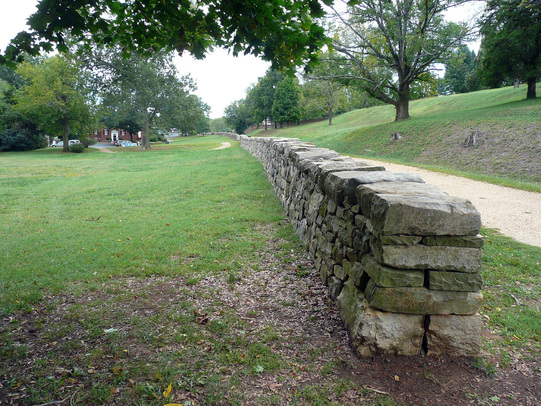
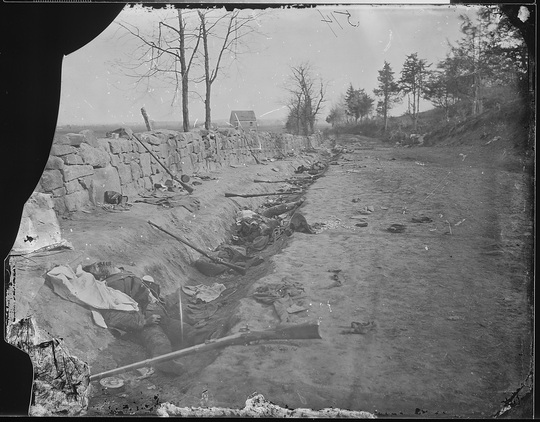
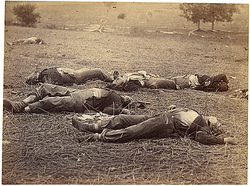
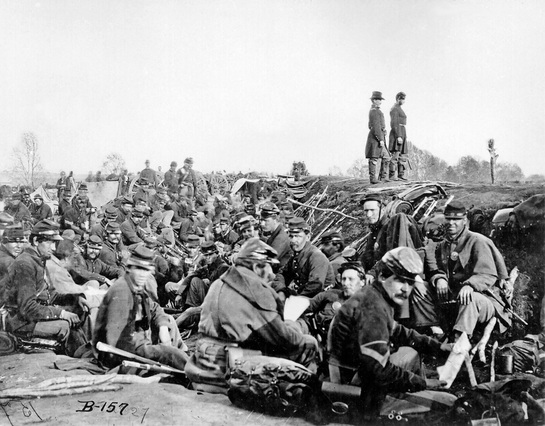
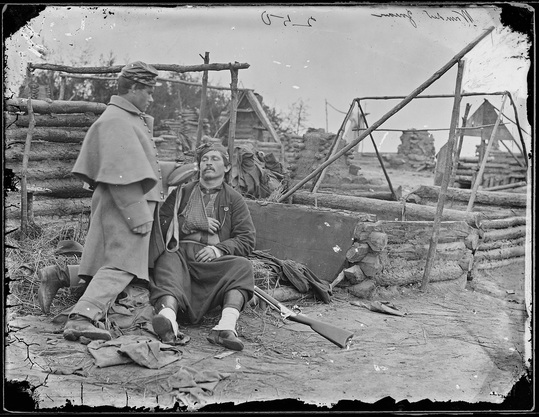
 RSS Feed
RSS Feed
